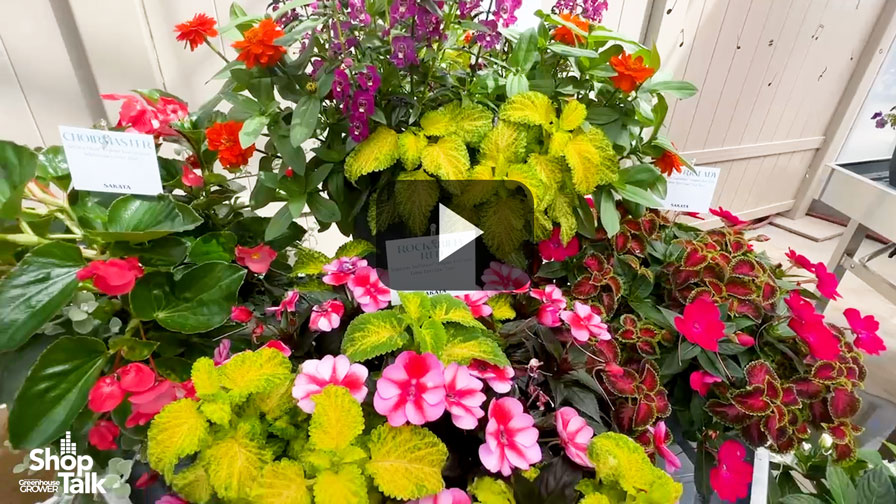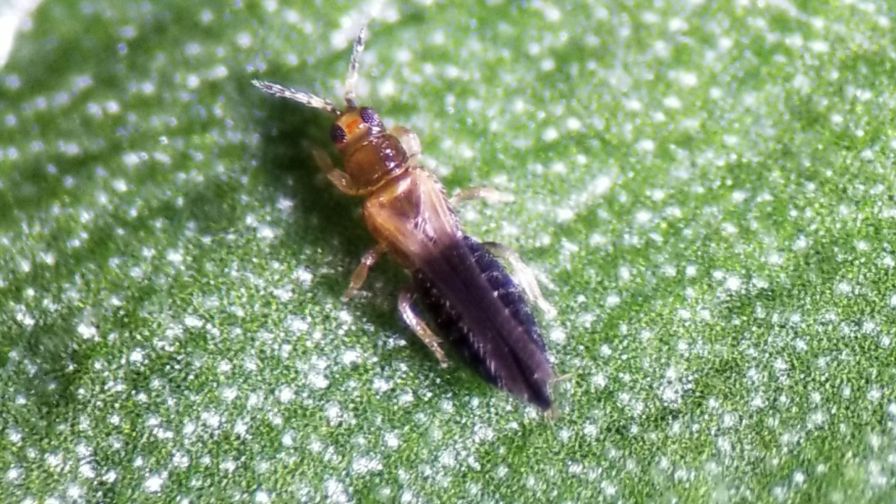Prides Corner Farms Is Building on a Strong Legacy
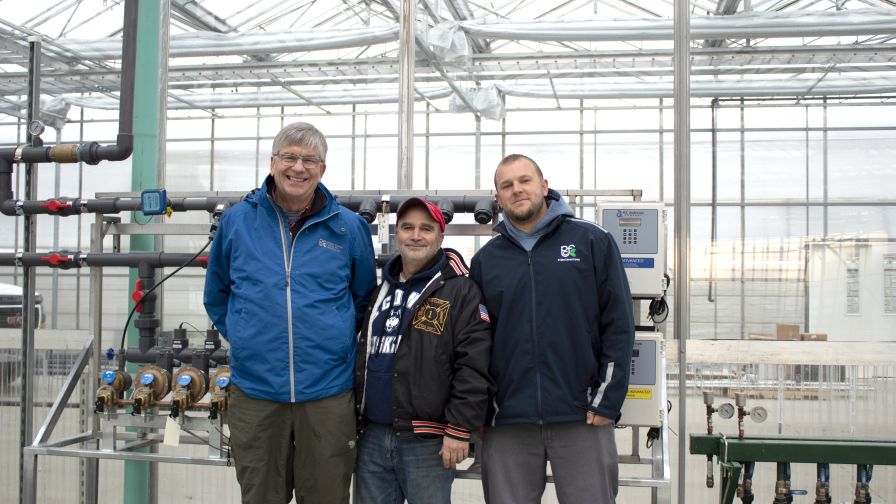
The Prides Corner team includes (from left): Mark Sellew, Owner; Sebastian Ruffino, Propagation Manager; and Evan Brand, Nursery Manager. Photos: Rebecca Niver, Griffin Greenhouse Supplies
If there’s one thing that has been clear throughout the 40-plus year history of Prides Corner Farms, it’s that innovation never stops. Through technology investment to matching variety selection with consumer demand, the Lebanon, CT-based company, whose total production (outdoor and controlled-environment) encompasses around 700 acres in multiple locations, has been able to establish itself as one of New England’s most advanced growing operations.
Prides Corner’s most recent endeavor has been upgrading its propagation facilities, as well as an overhaul of its irrigation system.
“Because we don’t have access to a major fresh water source in our area, we needed to become more self-sufficient in our water use,” says Evan Brand, Nursery Manager at Prides Corner Farms. “Our long-term goal is to recapture and reuse 100% of the water we have.”
More Efficient Water Use
The process started a couple years ago, when Brand and the Prides Corner management team approached Griffin Greenhouse Supplies, its long-time supply partner, to map out the project. Initially, the plan was somewhat complicated.
“Our terrain is very hilly, so we needed a system that could handle a range of pressure points,” Brand says. “We also needed to ensure a clean water source, since even a fraction of a percentage of pathogens can be crippling.”
The older system pumped water from a 3-acre pond, and this water was applied to Prides Corner’s liner range. Brand says there was little control of water quality.
The new system pulls water out of a larger pond that has already been recaptured. The water is filtered to physically remove any particulates, then goes through an ozone and sterilization process before it is moved into a holding area that becomes an on-demand source of clean water.
In the greenhouse, most water is applied via overhead irrigation. The plants are also treated with a polymer wetting agent that helps them maintain an adequate moisture level.
“We like the results on our peat- and bark-based media,” says Brand, who notes the wetting agent is used in all woody ornamental and perennial mixes.
The irrigation project is still a work in progress, although Neal Farnham, Regional Sales Manager with Griffin, says the end result should make a huge difference.
“We anticipate being able to irrigate 18 bays 150 feet long each with 24,000 gallons of water from two water silos (with room for a third) on any given day if necessary,” says Farnham, who’s been closely involved in managing the project.
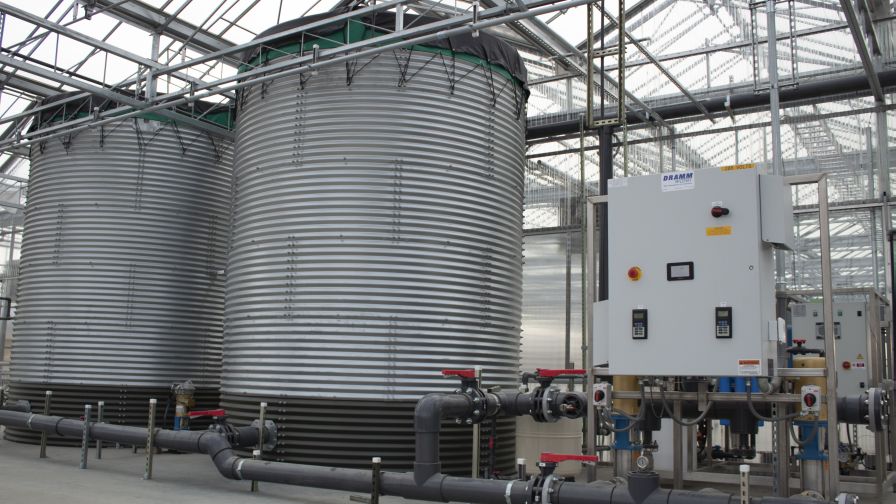
Prides Corner Farms is updating its water circulation process to allow treated water to be held in ready-to-go silos.
Lessons Learned and Next Steps
One of the next goals at Prides Corner, Brand says, is looking for ways to better automate the irrigation process.
“We want to water at night when it’s most efficient, and we’re also looking for ways to reduce the labor components of irrigation, which is our biggest expense,” Brand says. “Our goal is to come up with a system that works best not just in our outdoor nursery, but in our flowering perennials and herbs as well.”
Even though the project is still ongoing, Brand says he’s already learned several lessons that can be applied to future projects:
“As we continue to grow, we need to look for ways to be more efficient. Anything we can do to streamline responsibilities is critical.”
“Scaling and sales need to work hand in hand. We need to be as accurate as possible with our sales projections, so we can accurately calculate how much we can scale in size.”
“Consulting with experts like the Griffin team is important. They can help us decide which vendors to work with, and they can be realistic and keep our expectations in check if necessary.”
Other Renovations Planned
The irrigation upgrade is not the only new project in the works at Prides Corner. Brand says one of his immediate goals is improving the operation’s potting process.
“Our current system is somewhat archaic and incurs a lot of labor costs,” Brand says. “We’re looking at soil mixing systems that will allow us to move people off those lines into areas where they’re needed more.”
He hopes a revamped system could pay for itself within a year.
Another project taking shape is an updated lighting system at Prides Corner’s tissue culture lab.
“Our current lab is not high-tech, but we’re designing a new propagation facility that will have proven, appropriate lighting to get maximum production out of our tissue culture liners,” Brand says.
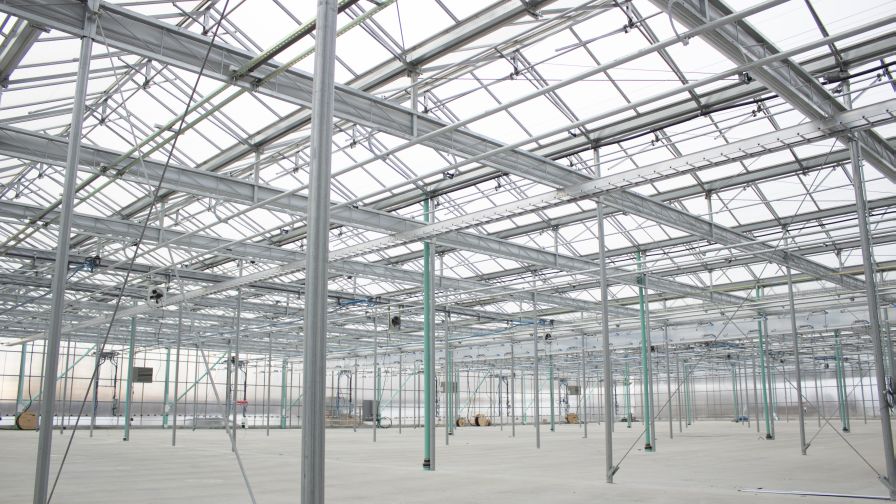
The facilities at Prides Corner are getting an upgrade, with new lighting and potting production lines.
Responding to Industry Change
Like almost every other operation, Prides Corner is facing unprecedented supply chain challenges.
“The business is out there for us to keep moving production, but the ability to quickly replace the product you’re selling isn’t that simple anymore,” Brand says. “Filling internal demand for peat moss and containers is definitely our biggest challenge right now, and it’s forced us to have our ducks in a row. This is no time to be making a gut decision; we need to be thoughtful in our approach and preemptive in our ordering habits. The cost of not having components ready to go is lost opportunity and unproductive labor.”
On the flip side, Brand says national supply chain issues have also presented opportunities.
“Since freight is a challenge, West Coast growers have had to shorten their supply chain,” he says. “We’ve been able to pick up some market share because of that.”
The bleak spring of 2020 that was followed by massive growth for the industry has also led Prides Corner to look outside the box to reach its customers. This has included improving the online ordering process.
“We want to make it easier for people to do business with us,” Brand says. “If we can become their preferred supplier, we want to make sure we stay ahead of what they want.”
Why They’re Excited for the Future
The future is looking bright at Prides Corner Farms. Brand explains what trends he and others at the company are most excited about, and how they’re responding.
- New and exciting natives. The market is demanding more native alternatives to traditional landscape plants not native to the U.S., and Prides Corner is focusing on growing more and better natives. It is also working to develop, breed, and select better native selections so they perform every bit as well for the end consumer.
- Ecommerce. “It’s a changing world for the nursery business, and there are lots of new companies selling online to reach a different, younger audience,” Brand says. “The industry needs to adapt to keep growing. We have developed a strong online presence for ease of our customers ordering and allowing them more flexibility and options with their deliveries.”
- Reducing chemical and fertilizer inputs. Brand say Prides Corner wants to be better stewards of the environment. It is doing so by taking part in the MPS sustainability program and eliminating and reducing chemical usage wherever possible, as well as implementing biological controls in place of chemicals.
- Recycling. ”We have a pilot program that we started with our Vermont customers in 2021 to take back and recycle their used plastic pots,” Brand says. “We recycle 100% of our plastic waste from the farm.”
- Solar. Prides Corner has already and is continuing to install solar on its largest power-consuming buildings so it can produce its own, cleaner energy.
A Brief History of Prides Corner Farms
- 1979: Prides Corner had an inauspicious start with 50 acres, a handful of greenhouses, and little else besides the dream of producing shrubs for local garden centers. Started by Peter Sellew, father of current owner Mark Sellew, Prides dreamed big even though resources were scarce and the actual knowledge of producing and selling plants even scarcer.
- 1980: Throughout the 1980s, Prides Corner gathered the staff and know-how that would serve it so well in the future. Fresh from his graduation at Cornell, Mark Sellew started at Prides Corner in 1980 to work with his father and to realize his dream of becoming a major grower in the Northeast. It took almost 10 years and untold sacrifice to reach the million-dollar mark in sales, but throughout this decade of struggle, Mark and Peter’s vision of the grower that Prides Corner would become sharpened and became closer to reality.
- 1990-2000: Prides Corner became the industry leader in developing an incredibly diverse selection of plants to sell, innovative marketing and branding for the plants they grew, and state-of-the-art logistics that delivered their products to customers with the quickest turnaround in the industry.
- 2016: Purchased Millane’s Nursery and opened a 30-acre yard and production facility in Cromwell, CT, the following spring.
- 2019-2020: Purchased Holdridge’s growing facility in Ledyard, CT, in August. Starting in spring 2020, Prides began offering annuals as part of its lineup. as well as more woody plant material. (50 acres)
- 2020: Purchased Robert Baker’s Main Farm in West Suffield, CT, to allow Prides Corner to custom-grow additional woody material for its customer base, as well as ship this material directly from the site. (150 acres)




